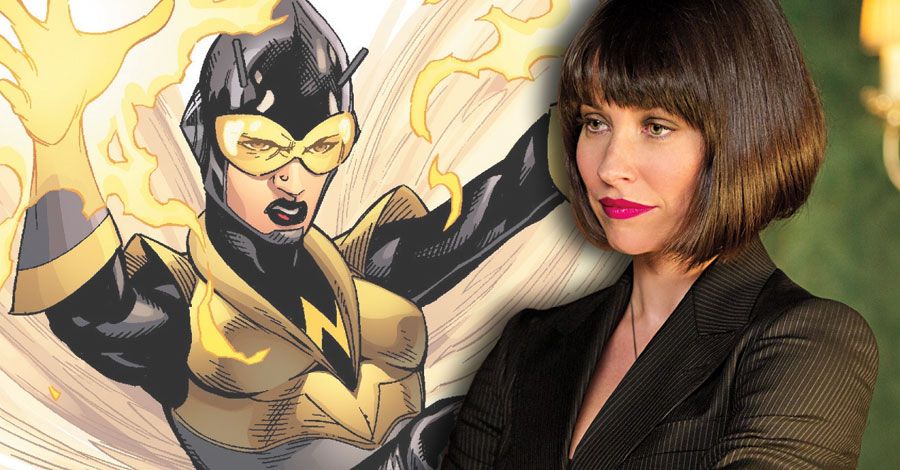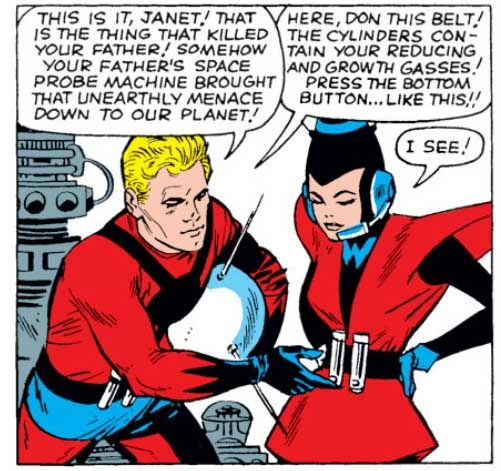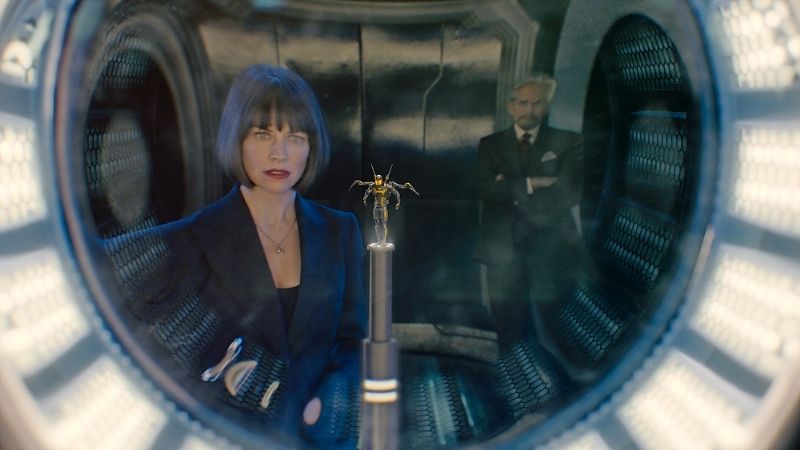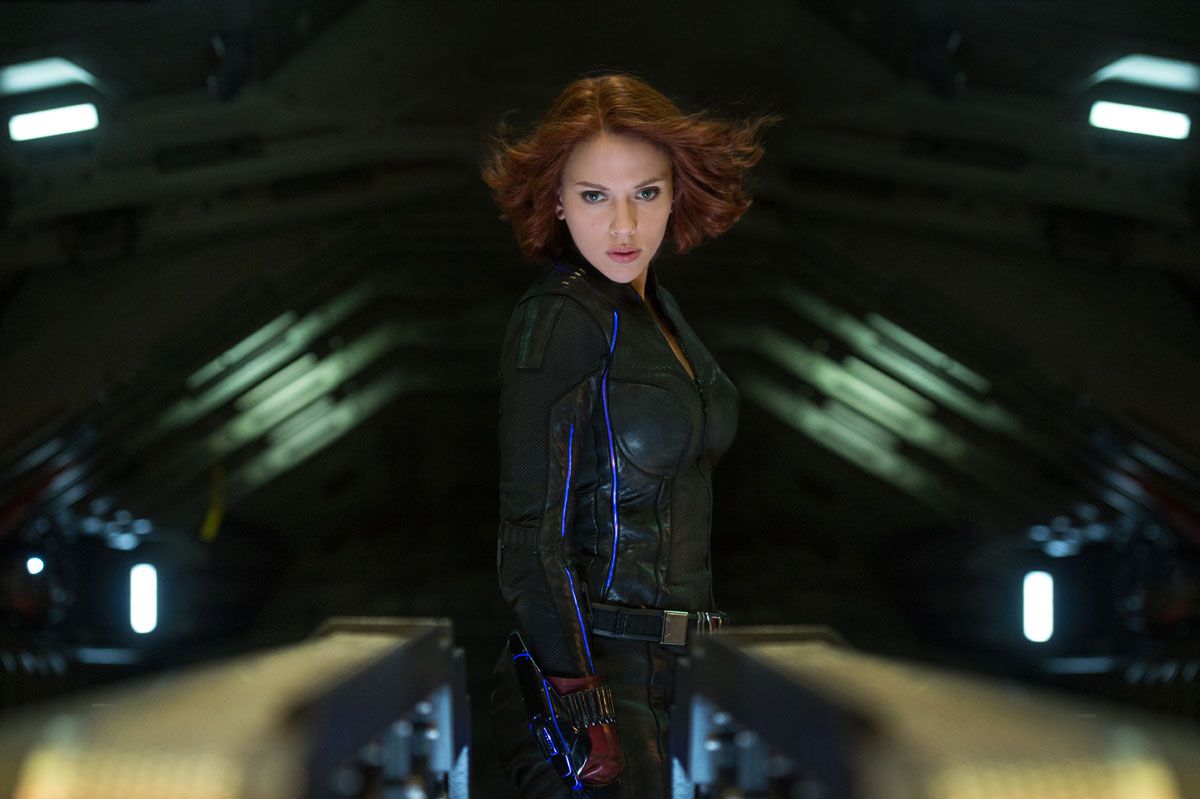Marvel Studios' "Ant-Man" had a lot going against it from the start.
Not only is the movie based on an obscure Marvel hero, Edgar Wright, the popular director who was attached to the project for years, dropped out late in the development phase due to creative differences with Marvel. And when he left, so did a star or two, including Patrick Wilson. Regardless, Marvel forged on due to contractual agreements regarding the film's release date and stars. Despite that stretch of rocky road, the movie ended up being a decent, heartfelt story -- in most areas, anyway. Like the Marvel Cinematic Universe, "Ant-Man" has a glaring lady problem. More than that, it may be Marvel Studio's worst blunder with female characterization yet.
The film caused a lot of uproar when it came to its treatment of Janet van Dyne, the original Wasp -- and for good reason. Prior to the movie's release, multiple interviews revealed that a great tragedy happened to Jan in Hank Pym's early days as Ant-Man, bad enough for him to hang up the suit once and for all, and to put a nail in the coffin of the relationship between him and his daughter, Hope (Evangeline Lilly). There was a swift and immediate outcry among the fans, who called "fridging" on the film through the #JanetVanCrime hashtag on Tumblr and Twitter -- and rightfully so, as Jan appears in the film in only a minor role, in order to die and provide a source of angst for Pym.
The film pushes Hope as a replacement for her mother, who, in the comics, is a founding Avenger -- the teammate who coined the group's name, in fact. Unlike Jan, Hope is a blank slate, having appeared in only a handful of comics, and then only as an alternate reality version of someone who never really existed in the main Marvel Universe in the first place. Instead of taking advantage of a character unweighted by years of continuity, however, the film squanders Hope, stuffing her with lazy cliches and harmful tropes.
RELATED: Kevin Feige, Peyton Reed Talk "Ant-Man" and The Wasp
First, Hope is the only woman in a sea of men, with the exception of Lang's ex, Maggie, who appears on screen even less than her fiance, Paxton. As the only female protagonist, Hope is immediately set up for failure; as is the case with this particular trope, which is prevalent throughout the MCU, she must fill the hopes and desires of all women in her respective film. That is, where there is a variety of personalities among the men with which the audience can identify, you either enjoy or dislike Hope; there are no alternatives. She must be everything for all women and the men who enjoy female characters. She is the Be All End All, the de facto Woman of the film.
Second, she embodies the "bitchy business woman" trope. In the beginning, Hope is cold. She refers to her father by his first name, she scoffs at Scott's ineptitude, she's all business. Her main plotline in the film is to break down the wall that has left her unfeeling for so long, which plays into the idea that women can only succeed if they abandon all emotion except scorn and rage. This doesn't last through the film, as per the cliche, but it's used as an establishing quality of her character.
Third, she is forced to train the inept male hero despite the fact that she is clearly more capable than him. She reveals the fact that she has intense martial arts training while schooling Scott Lang, and later shows him up by summoning an entire battalion of ants with her father's communicator. She has extensive knowledge of her father's technology, in that she helps Lang master it alongside her father. What's more, as the inside woman who has long since gained Darren Cross' trust, she could easily slip into Pym Technologies without unwanted attention, unlike Lang. However, she never becomes a fully realized hero in her own right because...
She falls victim to a fourth trope. The, "this is in your best interest" trope. Throughout the first half of the film, Hank keeps the secret of Jan's death from Hope in order to "protect" her, sparking a grudge that lasts years. Because of Jan's untimely demise, Pym actively prevents Hope from becoming a hero on her own under the guise of her value to him. Hope isn't shy about her desire to take matters into her own hand; she grows visibly frustrated with her father, who puts a stop to that notion without really even hearing her out, causing outbursts of anger where she then out-performs Lang. The trope is played up in a scene between Hope and Lang, where he helps convince her that Hank has her best interest at heart, and to ignore her capabilities in order to assuage her father's fears. To make matters worse, Pym is the one who gives her permission to be a hero in the mid-credits stinger. In this, Hope's agency is stripped away; she becomes a tool through which to prove Pym's emotional growth. Rather than having her own wherewithal to step into the hero role, she must wait and fall back on her father. This is a popular superhero trope, one that often works to undermine the agency of female characters (often love interests) under the guise of the protagonist's protectiveness, but this protectiveness often lands the object of it in hot water. Though easily misused, the trope can also be used to greater effect, like "The Flash's" phenomenal handling of it in its first season when Iris confronts Barry and her father with righteous indignation. Unfortunately, however, the trope actively works against Hope.
Tropes, in and of themselves, are not negative things; they can be used to lay the foundation for characterization and act as an entryway to ease the audience into a piece. However, a trope without development can easily stay a cliche and/or reinforce harmful stereotypes. In Hope's case, the combination of these tropes and cliches does just that, resulting in lazy writing and characterization. Where the film had an opportunity to create a complex new character, the writers chose the easy way out and the movie suffered for it.
Here, the result of these tropes -- Hope's untapped potential -- comes into play. As she isn't allowed to become her own hero, Hope falls by the wayside. That isn't to say she does nothing; she comes up with the film's big plan, trains Lang and even protects her father from being killed by Cross. However, she is consistently sidelined by the men of the film, using her seemingly autonomous actions to aid them. Her plan ends up being fulfilled by Lang, her training goes into improving Lang's skills, and her only real action scene, which lasts for just a few moments, is reactionary, and she must still be saved by the men in the end. Further, the film almost absent-mindedly sets up a dozen or so could-have-beens for the character that it ultimately doesn't address. Why couldn't she have just taken the suit for herself (perhaps because it doesn't have the breasts built in, like the suit given to her at the end)? Nothing that Hope did in the final act proved her mettle more than she had in the first two acts of the film, so what triggered Pym's change of heart and had him hand her the suit after all of the big action went down? Plus, how badass would it have been if Ant-Man and Wasp had tagteamed Yellowjacket in the very end?
RELATED: Johansson Weighs In on Possibilty of Standalone Black Widow Film
While all of this is frustrating, it's made more so by the fact that this new character was created to replace an existing female character who could have offered so much more to the film, and to the greater Marvel Cinematic Universe. In the comics, Jan van Dyne is a famous fashion designer in addition to her superheroic extracurricular activities; she's a character who provides a feminine edge to a world positively bursting with white male bravado, which -- in essence -- proves that femininity isn't something to be viewed negatively within such a world. I've written at length about the ways in which Jan is irreplaceable, and the weak alternative Hope provides is simply insult to injury. She pales in comparison to what could have been an established female character who breaks the MCU's strong female character template, as typified by existing characters like Black Widow and Gamora.
Hope is very much analogous to Marvel Studio's treatment of women. That isn't to say that Marvel has churned out poor female characters; on the contrary, Black Widow, Maria Hill, Pepper Potts and Jane Foster largely manage to stand out in the films in which they appear. However, they are not the heroes of their respective films, and are often sidelined for the titular characters (perhaps rightfully so, as they are not the main character). The first female-led title from Marvel Studios, "Captain Marvel," is slated for a 2018 release. By that point, Marvel will have produced almost 20 films, meaning that there are roughly 20 films in which the female character can get sidelined. Like Hope's presence in "Ant-Man," fans are expected to be happy that these female characters simply exist; what's more, they are led on by consistent teasing: Marvel Studios president Kevin Feige has been notoriously vague about the possibilities of a "Black Widow" standalone, despite fan outcry and Scarlett Johannson's willingness to star in one. As fans, we are supposed to be satiated by the possibility of Hope becoming the Wasp in the mid-credits stinger, with no in-story assurance that she will appear elsewhere in the MCU. (Feige has since confirmed she will be in another Marvel film.)
None of this is to say that "Ant-Man" is a bust of a film. On the whole, the movie is quite enjoyable. Paul Rudd's charisma carries the film, the family and heist elements inject new life into the MCU, a number of moments are laugh-out-loud funny, and the ensemble cast steals the show. Bottom line: there's a lot of merit to the film. However, Hope's poor writing is awful to the point of distraction; every time I started to really enjoy the film, Hope did something cliche, halting the forward momentum of the story. If there had been more than one main female protagonist, this is a problem that likely wouldn't have occurred in the first place.
In most MCU films, the female protagonists prove their worth, quickly and thoroughly. Pepper Potts made sacrifices in "Iron Man." Black Widow had a large part to play in analyzing Tony Stark and taking down Ivan Vanko in "Iron Man 2." In "Guardians of the Galaxy," Gamora is known as the deadliest assassin in the universe with the skills to match. Peggy Carter defies the stereotypes of her time to become a proficient military leader in "Captain America: The First Avenger." Though never quite a superhero in the comics (at least until very recently), even Jane Foster saved the Odinson in "Thor 2." In "Ant-Man," however, Hope never gets her chance to shine like her predecessors -- and she's the one who has the honor of becoming the Wasp, who was one of the founding members of the Avengers (and the only founding Avenger to not get her own film or, at the very least, an independent, developed origin). Her treatment, as outlined above, feels very much she's been swept under the rug, in addition to the fact that she has been unnecessarily relegated to romantic interest with that forced, awkward kiss at the end.
With Marvel Studios' films, the long road to a female-led movie has been one exhaustive waiting game -- which is why Hope's treatment in "Ant-Man" is unacceptable. Though she is not the titular hero, the Wasp is inexorably linked to the legacy title's origin, in addition to her own personal one; even if Wasp isn't associated with Scott Lang, Marvel has seen fit to change much about the hero's development -- so why must the Wasp be the one to suffer for it with almost complete erasure? The movie concludes with only a promise of Hope's Wasp and a glimmer of a hint that Jan may yet be alive (an idea I've explored previously), in turn expecting fans to be assuaged by the idea that we may, perhaps, one day see them in action and to just be patient. However, with ten origin films starring white men, fans have been plenty patient; why is it so difficult for Marvel to allow a true superheroine -- one who wants to be and doesn't come with a past full of baggage -- like the Wasp a chance to shine? Why must the female hero always wait, while the male heroes routinely get their chance? Unfortunately, Marvel hasn't provided any good answers to those questions and "Ant-Man" honors that infuriating tradition by shelving the only female founding Avenger.




